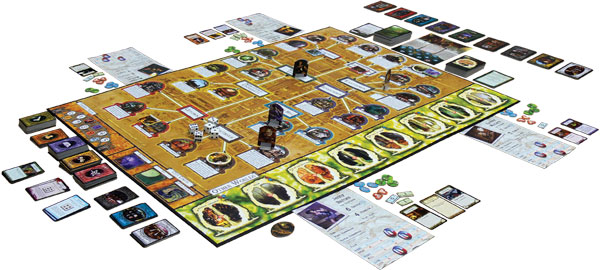
I've been thinking about two things recently: board game design, and Patrick Stuart's stuff (specifically the dire warnings about the Derro that are currently controlling you with subterranean rays). This has made it pretty obvious that the Board Games that currently exist can't achieve the following effects:
- Doubt that something exists.
- The feeling that you should not seek to determine whether or not something exists.
- Knowing that something exists, but having no comprehension of how, why, or to what purpose.
- The understanding that the world is based on systems you cannot and should not understand.

Here's some possible ways to fix this:
- A single player is given knowledge of the rules, and told to keep them secret at all costs. All other players know how to interact with the system, but do not understand the full implications of those interactions.
This is the solution Videogames and Tabletop RPG's use. The advantage of a videogame here is that the all-knowing player is a machine, which cannot explain itself and has no friendship with you. The advantage of a human is that they aren't restricted by rules. - Each player is given knowledge of only a single part of the rules, like a revolutionary cell. These sections of rules all combine into a machine that is beyond the understanding of all players, and works against them with a malevolent intelligence.
At the start of the game, Player A is told to arrange the cards in a specific order. Player B is told what activates specific cards. B gives the cards to C, who knows what the cards actually do. All players conceal their information, because they're working against each other. This means they don't realize the disasterous impact of the tasks they're performing until it's too late.
- You are not told the implications of your goals until you've achieved them.
Risk Legacy does this with the packets above. Each packet holds something that changes the game permanently; you don't know how the game will change until the packet is opened.
It's easy to imagine this taking lovecraftian significance. You are told that packet 9 will hold something wonderful. You make great sacrifices to open it - but as you do, you unlock other packets, which hint that something appalling lurks in packet 9.
Spoilers for Risk Legacy:
Hidden in the box, under the insert, is a small packet that says "Do not open. Ever."
The contents of this packet is selected randomly. Even the creator doesn't know what is in your packet, and whether or not you should open it.



No comments:
Post a Comment